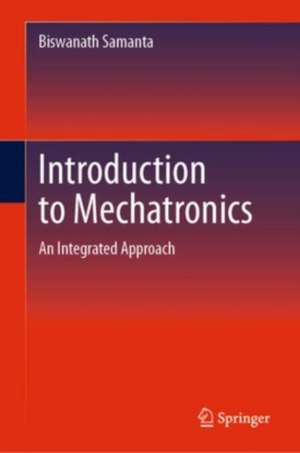Introduction to Mechatronics: An Integrated Approach
Autor Biswanath Samantaen Limba Engleză Hardback – 9 mai 2023
| Toate formatele și edițiile | Preț | Express |
|---|---|---|
| Paperback (1) | 402.05 lei 38-44 zile | |
| Springer International Publishing – 10 mai 2024 | 402.05 lei 38-44 zile | |
| Hardback (1) | 574.38 lei 38-44 zile | |
| Springer International Publishing – 9 mai 2023 | 574.38 lei 38-44 zile |
Preț: 574.38 lei
Preț vechi: 709.12 lei
-19% Nou
Puncte Express: 862
Preț estimativ în valută:
109.90€ • 114.75$ • 90.96£
109.90€ • 114.75$ • 90.96£
Carte tipărită la comandă
Livrare economică 01-07 aprilie
Preluare comenzi: 021 569.72.76
Specificații
ISBN-13: 9783031293191
ISBN-10: 3031293193
Pagini: 355
Ilustrații: XXI, 355 p. 1 illus.
Dimensiuni: 155 x 235 mm
Greutate: 0.75 kg
Ediția:2023
Editura: Springer International Publishing
Colecția Springer
Locul publicării:Cham, Switzerland
ISBN-10: 3031293193
Pagini: 355
Ilustrații: XXI, 355 p. 1 illus.
Dimensiuni: 155 x 235 mm
Greutate: 0.75 kg
Ediția:2023
Editura: Springer International Publishing
Colecția Springer
Locul publicării:Cham, Switzerland
Cuprins
Chapter 1. Introduction.- Chapter 2. Basic Electrical Circuit Elements and Circuit Analysis.- Chapter 3. Basic Electronics.- Chapter 4. Dynamic System Characteristics.- Chapter 5. Analog Signal Processing and Operational Amplifiers.- Chapter 6. Data Acquisition and Digital Signal Processing.- Chapter 7. Sensors.- Chapter 8. Digital Circuits.- Chapter 9. Actuators.- Chapter 10. Microcontroller Programming and Interfacing.- Chapter 11. Basic Control Systems.- Chapter 12. Mechatronic Systems.
Notă biografică
Biswanath Samanta received B.Tech. (Honors) and Ph.D. in Mechanical Engineering from Indian Institute of Technology (IIT), Kharagpur. He is an Associate Professor in the Department of Mechanical Engineering at Georgia Southern University (GS), Statesboro, GA, USA. Prior to joining GS, Dr. Samanta held academic positions at Villanova University, Villanova, PA, USA; Sultan Qaboos University, Muscat, Oman (offering ABET-accredited Mechanical Engineering program); and IIT, Kharagpur, India. His expertise and research interests include broad areas of dynamic systems and control, mechatronics, robotics and intelligent systems, advanced signal processing, prognostics and health management, artificial intelligence (AI) and deep learning, and applications of AI in engineering and biomedicine. Dr. Samanta has developed and taught numerous courses in these areas and supervised students at both undergraduate and graduate levels (including 3 PhD and over 45 MS theses). He has over 150 refereed research articles published by professional bodies like ASME, IMechE (UK), AIAA, and IEEE, and other publishers including Elsevier and Springer. The papers are regularly cited by independent researchers in their publications (over 4960 citations). He is a senior member of IEEE and a member of ASME, and currently the President of Robotics Technical Committee, Dynamic Systems and Control Division (DSCD), ASME. He regularly serves as a reviewer of technical papers submitted for publication in several international journals and conference proceedings, as an evaluator of book proposals submitted to different publishers, and as an examiner of PhD theses submitted to different international universities. He is also regularly invited to chair sessions in international conferences. He is on the Editorial Board of international journals as an Associate Editor, ASME Letters in Dynamic Systems and Control; Associate Editor, Neuroimaging and Neuromodulation (specialty section of Frontiers inNeuroimaging); Academic Editor, Sensors; and Advisory Board Member, Sci.
Textul de pe ultima copertă
This textbook presents mechatronics through an integrated approach covering instrumentation, circuits and electronics, computer-based data acquisition and analysis, analog and digital signal processing, sensors, actuators, digital logic circuits, microcontroller programming and interfacing. The use of computer programming is emphasized throughout the text, and includes Matlab for system modeling, simulation, and analysis; LabVIEW for data acquisition and signal processing; and C++ for Arduino-based microcontroller programming and interfacing. Prof. Samanta provides numerous examples along with appropriate program codes, for simulation and analysis, that are discussed in detail to illustrate the concepts covered in each section. The book also includes the illustration of theoretical concepts through the virtual simulation platform Tinkercad to provide students virtual lab experience.
- Adopts a hands-on and “minds-on” pedagogy emphasized throughout the text.
- Reinforces concepts with solved examples and computer codes, integrated with validation of each topical cluster.
- Provides visualizations, computational analysis, design, simulation, and physical and virtual demonstration experiments.
Caracteristici
Adopts a hands-on and “minds-on” pedagogy emphasized throughout the text Reinforces concepts with solved examples and computer codes, integrated with validation of each topical cluster Provides visualizations, computational analysis, design, simulation, and physical and virtual demonstration experiments
